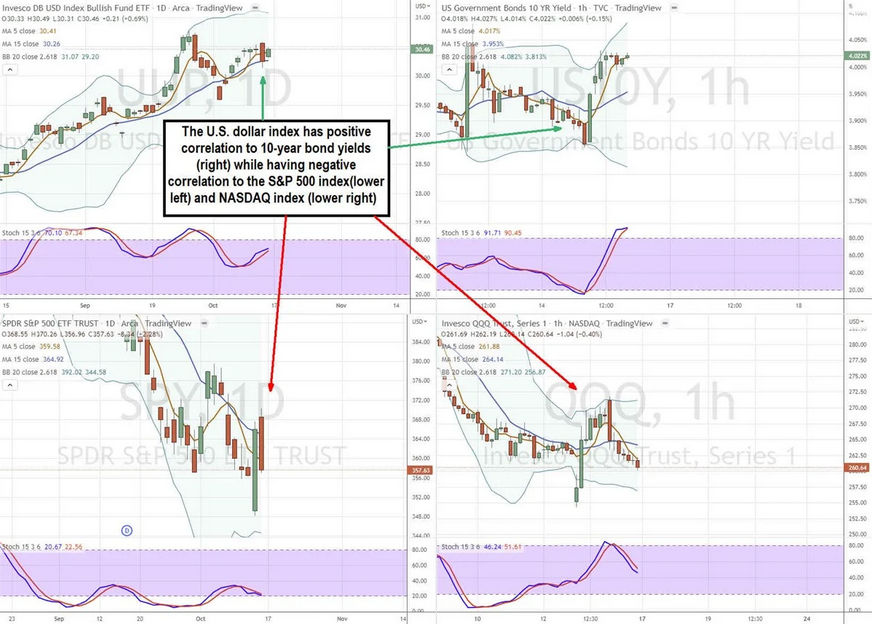3 Stocks That Benefit From A Strong U.S. Dollar
MarketBeat.com | Oct 17, 2022 05:57AM ET
- The U.S. dollar index is up 18% for 2022
- Importers benefit from a strong U.S. dollar as their purchasing power improves.
- Exporters get hurt by a strong U.S. dollar as they get paid less for their products.
- Walmart (NYSE:WMT), Dollar Tree (NASDAQ:DLTR), and Darden Restaurants (NYSE:DRI) are three benefactors of a strong U.S. dollar
A strong U.S. dollar results in more buying power for U.S. importers and U.S. tourists buying products overseas. However, it’s terrible news for U.S. companies that export U.S. products overseas as they receive less. We’ve seen the warnings from significant players as their earnings and forecasts get lowered from the impacts of continued strength in the U.S. dollar.
The stock market didn’t punish companies too harshly for currency impacts as they also reported in constant currency to smooth out the volatility. However, the substantial U.S. dollar impacts are a disorder that adds to the existing inflationary pressures , supply chain constraints, eroding consumer spending, and rising interest rates.
This pain is felt by major U.S. conglomerates and technology companies as the pandemic , inflation stood at an average of just 1.9% in 2019. The COVID pandemic triggered government-mandated lockdowns forcing economies and businesses to come to a screeching halt. This caused inflation to drop to an average of 1.2% in 2020 as factories and plants were taken offline, and companies dropped production and cut inventories to handle the demand shock.
When the reopening took effect, producers were caught off guard as pent-up demand triggered a massive supply shock driving up prices in everything from food and energy to cars and collectibles. The supply chain disruptions only made matters worse as container ships stalled at ports for weeks while the supply of shipping containers ran out.
This caused inflation to surge to 9.1% in June 2022. This prompted the U.S. Federal Reserve to accelerate its rate hikes as it realized that inflation was not “transient” and the economy was too strong. They raised interest rates by 3% in six months, which caused the U.S. dollar to surge through 17-year highs.
This caused bonds to collapse and yields to spike. It also triggered an inverted yield curve stoking recession fears. The collapse of the British pound sterling has accelerated the strength in the U.S. dollar and rise in bond yields, causing equity markets to fall to lows.

The Losers
Globalization has been punishing U.S. companies that receive a large chunk of their revenues from overseas. UnitedHealth Group (NYSE:UNH) . These shares are up 7.4% and 2.1% for the year.
The Winners
However, there’s always to flipside to any situation. Here are three U.S. stocks benefit from a strong and rising U.S. dollar. Companies that buy goods from overseas have more purchasing power. These companies benefit, especially if the rate of increase in the U.S. dollar is greater than the inflation rate (IE: 18% vs. 8.1%). Importers are the winners. The largest importer in the U.S. is Walmart Inc (NYSE:WMT) whose shares are only down (-9.8%) versus the SPY. High inflation is pushing consumers to find ways to stretch their wallets.
This is driving growth to discount retailers. 1,800 full-service restaurants throughout the U.S. and Canada, including premium brands like The Capital Grille and Eddie V’s to popular, affordable brands like the Olive Garden and Longhorn Steakhouse.
The nation’s largest full-service restaurant chain imports food from pork to seafood and beef from over 1,575 suppliers throughout Bank of America (NYSE:BAC) , it has the “highest positive correlation to the U.S. dollar of any stock Bank of America covers”.
Original Post
Trading in financial instruments and/or cryptocurrencies involves high risks including the risk of losing some, or all, of your investment amount, and may not be suitable for all investors. Prices of cryptocurrencies are extremely volatile and may be affected by external factors such as financial, regulatory or political events. Trading on margin increases the financial risks.
Before deciding to trade in financial instrument or cryptocurrencies you should be fully informed of the risks and costs associated with trading the financial markets, carefully consider your investment objectives, level of experience, and risk appetite, and seek professional advice where needed.
Fusion Media would like to remind you that the data contained in this website is not necessarily real-time nor accurate. The data and prices on the website are not necessarily provided by any market or exchange, but may be provided by market makers, and so prices may not be accurate and may differ from the actual price at any given market, meaning prices are indicative and not appropriate for trading purposes. Fusion Media and any provider of the data contained in this website will not accept liability for any loss or damage as a result of your trading, or your reliance on the information contained within this website.
It is prohibited to use, store, reproduce, display, modify, transmit or distribute the data contained in this website without the explicit prior written permission of Fusion Media and/or the data provider. All intellectual property rights are reserved by the providers and/or the exchange providing the data contained in this website.
Fusion Media may be compensated by the advertisers that appear on the website, based on your interaction with the advertisements or advertisers.